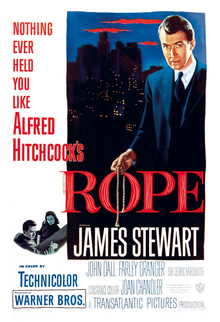This is another one of Alfred Hitchcock’s more experimental films, set in a single location and elaborately planned out to create the illusion of a single continuous, uninterrupted take. Even the plot is novel as the audience is shown the body and who the murderers are right at the beginning so the whole thing is an elaborate game over which, if any, of the other characters catch on. This film had a mixed reception on release and some critics thought that it was technical cleverness and nothing else. Like much else of Hitchcock’s oeuvre however it has been redeemed nowadays and I don’t consider it a minor film at all.
Brandon Shaw and Phillip Morgan, two friends who are students at Harvard University strangle one of their fellow classmates David Kentley with a length of rope and stash the corpse in a large chest. Their motive, as espoused mainly by Brandon, is to prove that they are superior beings who don’t have to be tied down by the moral codes of their lessers. To cement this, they organize a dinner party with the chest right in the middle of the living room. Among the guests include Janet, David’s fiancée and David’s father. But they also invite Rupert Cadell who was their housemaster while they were in prep school and from whom Brandon originally learned his Nietzschean-inspired philosophy. Brandon likes to believe that Rupert would approve of what they have done and keeps dropping subtle hints as the other guests become increasingly concerned about David’s absence. As Rupert’s questioning gets more pointed, the more nervous Philip starts losing his nerve.
This is one thriller film that is impossible to spoil as the audience already knows the truth from the outset and can easily predict how things will turn out. Hitchcock nevertheless succeeds in building suspense throughout as the other guests get closer to realizing that David’s corpse is right in the same wrong with them as they are eating. There are a ton of clues and references to the murder in the various conservations and it does get positively ridiculous how Brandon seems to want to get caught, but I suppose that’s part of his incredible and ultimately unfounded arrogance in believing that he is so far above the sheep that he will never be caught no matter how obvious the hints are. One disappointment is that there is no real sophistication in their philosophical arguments and Rupert eschews the reprehensive ideas readily enough once he realizes how serious the situation is. The motivation really is as shallow as two rich kids playing a sick joke under the mistaken impression that they smarter than everyone else.
Apart from the novel structure, the film is also technically impressive. While the cameras of the period were limited to filming a maximum of about 10 minutes at a time, Hitchcock edited the sequences together to create the illusion of a single, uninterrupted shot. As such the entire filming process was carefully choreographed to allow for movable walls and removing furniture and putting them back later so that the large cameras of the time could move around the set. Even the large backdrop of the city outside the window is a marvelous construction, set to animate with lights turning on, smoke coming out of chimneys, the light changing as time passes and so on. It seems that some of the actors at the time weren’t happy as the production emphasized the careful planning and rehearsal of all of these technical details rather than the actors’ performances but this actually presages all of Hollywood’s blockbusters today.
One point of confusion I had watching this is the nature of the relationship between Brandon and Phillip. They’re clearly not brothers and yet the maid who works in the apartment answers to the both of them and they both act as if they live there. An explanation can be found in the original source material, the play of the same title by Patrick Hamilton. There the two are explicitly portrayed as being in a homosexual relationship which does make sense but of course that is used as further evidence of their perversion which wouldn’t be acceptable today. In any case, this may not top tier Hitchcock, but I’d still rank it rather highly and recommend it.
